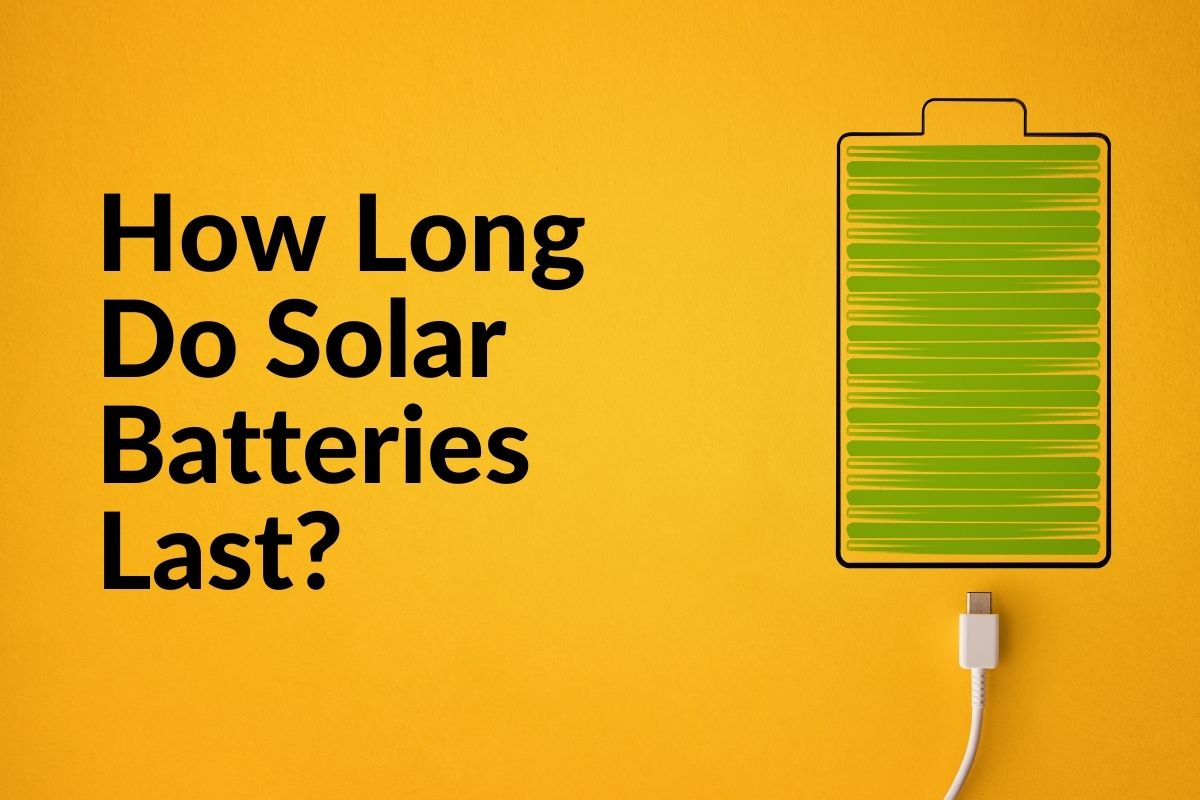How Long Do Solar Batteries Last?


Between rising electricity rates, unpredictable grid disruptions, and devastating natural disasters, it's no surprise that homeowners are increasingly turning to solar power to meet their energy needs. Solar power can only be generated when the sun is out, but that doesn't mean you can't enjoy clean energy around the clock. A solar battery system allows you to capture more of the sun's energy, storing it until you need it to power your home.
Before you invest in solar energy storage, however, it's a good idea to ask a few key questions. Most importantly, how long do solar batteries last? Which type of battery storage makes the most sense for you? Achieving great results with solar energy starts with being an informed consumer. To help you make the best decisions possible, let's take a deeper dive into the lifespan of solar batteries.

Whether it's a AA battery in your TV remote or a lead-acid battery in your car, all batteries are designed to store and release specific amounts of energy. Over time, this cycle of storing and releasing energy causes degradation that reduces the battery's storage capacity. Not surprisingly, the same is true of solar energy storage systems. Every solar battery eventually loses enough of its storage capacity that it can no longer function effectively.
However, it's important to note that not all batteries are equal. Certain solar battery systems incorporate innovative designs and high-tech features to slow the degradation process. While some batteries typically last just a few years on average, a high-quality system may be capable of meeting your storage needs for as long as 10 to 15 years.
Ultimately, the lifespan of a solar battery depends on a variety of complex factors. Understanding how these factors influence a battery's long-term performance can be extremely helpful in deciding on the best option for your home.
When it comes to storing solar energy, the type of battery you select can make all the difference. Lead-acid batteries have been a popular and affordable choice for decades, but they typically only have an expected lifespan of three to five years. Batteries based on modern lithium-ion technologies require a larger up-front investment, but they also degrade far more slowly and offer a substantially longer service life.
If you've ever compared solar batteries, you've probably noticed that each battery has a recommended depth of discharge. This indicates the percentage of a battery's total capacity that can be discharged during each charge cycle without risking long-term damage. A higher depth of discharge means there's more energy available to use and less risk of prematurely shortening the battery's lifespan.
For traditional lead-acid batteries, the recommended depth of discharge typically ranges from as low as 50% to as high as 80%. By comparison, lithium-ion batteries can often reach 90% depth of discharge during each cycle without ill effects. This makes them ideal for a variety of long-term solar energy applications.
When a battery stores solar power and subsequently releases it, some of the energy is invariably lost. This is reflected by a metric known as round-trip efficiency, which measures the percentage of energy a battery can turn into usable power. Higher round-trip efficiency means less waste and fewer charge cycles, which ultimately translates into less degradation and greater longevity.
Depending on the type of battery you choose, maximizing your system's service life may take some work. Flooded lead-acid batteries, for instance, require routine maintenance every few months to ensure proper function. This includes checking water levels, adding more when necessary, and keeping the terminals clean. Lithium-ion and sealed lead-acid batteries require virtually no attention, eliminating any worries over preventable wear and tear.
When you add solar battery storage to your home, you need to know you're making a wise investment. It may be tempting to opt for affordable lead-acid batteries, but a seductively low price tag doesn't guarantee savings. With a low depth of discharge, modest efficiency, and potential maintenance requirements, a lead-acid battery system may not meet your energy needs for long.
For reliable, efficient solar energy storage, it's hard to beat lithium-ion batteries. Despite the higher initial cost, greater longevity and enhanced performance make lithium-based batteries a more cost-effective option for many applications. Instead of replacing your batteries every few years, you may only need to replace lithium-ion batteries once over the entire lifespan of your solar energy system.
In particular, high-quality LG Chem batteries offer impressive performance that's guaranteed to last. With an outstanding 95% depth of discharge and 94.5% overall efficiency, LG Chem solar batteries are Sullivan Solar Power's preferred choice for energy-conscious homeowners. On average, LG Chem batteries retain at least 60% of their storage capacity even after 10 years of daily charge cycles. In fact, every battery is backed by a solid 10-year warranty from LG.
In the end, the best way to ensure great results is to work work with an installer you trust. The solar energy professionals at Sullivan Solar Power have the knowledge and experience to help you evaluate your storage needs and select the best batteries for your budget. Whether you're planning to go entirely off the grid or simply looking for a little peace of mind, the right solar batteries are key to unlocking the full potential of your solar energy system.